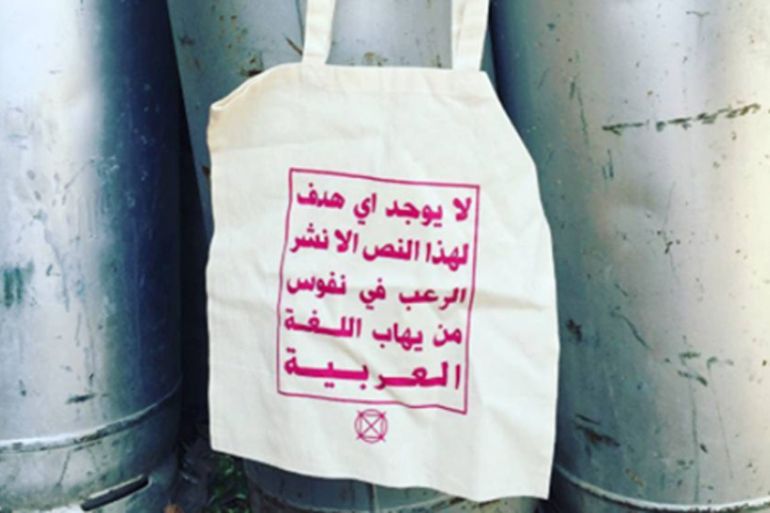Tote bag designers: Idea came from our reality as Arabs
Designers of “viral bag with Arabic text” aim to tackle social misunderstandings in humorous way.

Two Palestinian graphic designers saw one of their tote bag designs go viral after it was photographed on a train in Germany’s capital, Berlin.
In simple bold Arabic script, the text on the bag translates to “This text has no meaning except to scare people who don’t understand it”.
Keep reading
list of 4 itemsGeorgia’s president vetoes controversial ‘foreign agents’ bill
‘Regime machinery operating efficiently’ as Tunisia cracks down on dissent
Why Egypt backed South Africa’s genocide case against Israel in the ICJ
The picture of the bag has been widely shared and praised on social media and the two designers, Sana Jammalieh and Haitham Haddad, have been flooded with praise and inquiries about their product.
The pair founded Rock Paper Scissors design studio in Haifa, Israel, in May 2016.
Friends since their college days, they create T-shirts, bags and mugs that deal with social and gender issues in a humorous way.
Al Jazeera: Where did the idea for the tote bag design come from?
Haitham Haddad: When we first opened the studio we wanted to make some sort of tote bag design that was very simple in the way it looks but conveys a very straightforward message.
It came from our reality because we are Arabs – Palestinians living in Israel. There’s sort of a common fear or misunderstanding of the Arabic language here. So it was an in-your-face message to make fun of people who are scared of the Arabic language … and are afraid of it. Because people who don’t think much connect it directly to, you know what [terrorism].
READ MORE: Israel’s war on the Arabic language
In the studio, the entire way of expressing ourselves in design is based on humour and sarcasm and trying to point out that most people think in a very shallow way.
People holding the tote on their shoulders are somehow testing other people and mocking them because they don’t understand Arabic and they’re just afraid of the language, or the font, or the curviness of the Arabic.
Al Jazeera: What other challenges has the Arabic language faced in Israel?
Haddad: In the past five years, especially in cities like Haifa, people are trying to reclaim their Arab knowledge, or the language, or the use of the typography as a means to express themselves.
Sana Jammalieh: It wasn’t really bad before but there was a time when the Arabic language wasn’t cool. It kind of disappeared when the whole chatting programmes came 15 years ago – you couldn’t type in Arabic.
“Arabeasy” was invented, which is Arabic words written in English letters, which is really sad because Arabic started to disappear. But now you can type in Arabic and more people are aware of it, and hopefully Arabeasy will disappear again.
In a #Berlin metro:"This text has no other purpose than to terrify those who are afraid of the #Arabic #language." pic.twitter.com/ZOZDmekydu
— Nader Alsarras نادر الصراص (@NaderAlsarras) August 16, 2016
Al Jazeera: What is it like to have the picture of your design going viral?
Haddad: We’ve answered more than 500 messages on Facebook in the last day asking where they can buy the tote bag. And we are also trying to find out who’s trying to copy the print because a friend keeps sending us screenshots of people trying to steal the design or the text. It has already been happening.
It’s not a common saying or slang – it’s just a sentence that Sana and I made up, and that’s why when people put it on a T-shirt they are actually stealing or copying our work.
Since yesterday, we’ve been sending messages saying “please stop what you’re doing”. It’s just individuals trying to make the money that we don’t have!
Al Jazeera: Why do you think people have responded to the design in Europe?
Jammalieh: We make art and, like a painting, everyone sees it or connects to it the way they want to, so the same thing happened with this bag.
In Europe now there are bad conditions with the fear of Arabs and terrorism, and Arabic is obviously connected to that in their eyes. So it’s kind of the same thing Arabic language is being victimised and the whole Arab nation is being victimised and automatically related to terrorism, which is wrong.
Al Jazeera: What kind of response has the studio received directly?
Jammalieh: We’ve not had any bad feedback, not even one negative comment. Most people are asking where they can buy it, so that’s why we opened an online shop today. Due to all the requests and people copying our design we made sure that we sell our design because we don’t want people to copy it.
We came back from Berlin yesterday in the morning and we turned on our mobile phones and found out what’s happening. Five hours later we were in the studio working. We haven’t had much sleep!